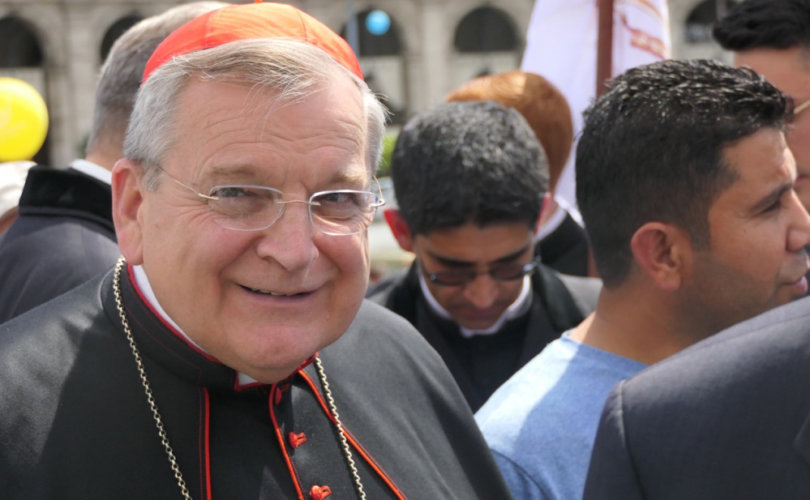October 22, 2018 (LifeSiteNews) — The Vatican’s recently signed deal with China on selecting bishops was “absolutely unconscionable,” and “a betrayal of so many confessors and martyrs who suffered for years and years and were put to death” by the Communist Party, Cardinal Raymond Burke said.
There are deep divisions with the curia, with some focused on the Vatican-China deal, Burke said while visiting Australia last week, according to The Australian. The divisions and the Vatican-China deal both come at the time while the Communist nation is ramping up religious persecution.
The Holy See signed a “provisional agreement” on September 22 with the People’s Republic of China on the appointment of bishops after months of speculation and apprehension among Catholics.
Through the agreement, Pope Francis has also decided to readmit into communion with the Catholic Church the Chinese government’s “official” bishops ordained without pontifical mandate.
The agreement has been criticized by many experts on China and other Catholics, especially retired Cardinal Joseph Zen of Hong Kong, long a fierce critic of the deal, who has called it a betrayal and a surrender.
Critics say the deal sells out the authority of the papacy in its handing over the task of naming bishops to the Chinese Communist Party, and that it also betrays the underground Church there.
Catholics faithful to Rome have had to practice underground for decades and have also been, along with other Christians, the object of heightened religious persecution by the government.
In the report from The Australian, also picked up by the Vatican-based Italian news website Il Sismografo, Cardinal Burke said he had no explanation for why Pope Francis had agreed to a deal yielding the Vatican’s power over appointing bishops to the Chinese government — something the Church would never do with other secular leaders.
Burke further criticized the claim by Vatican Archbishop Marcelo Sanchez Sorondo that the Communist Chinese state is exemplary in demonstrating Catholic social justice teaching — calling it “absurd.”
Sorondo, head of the Vatican’s Pontifical Academies for Sciences and Social Sciences, an Argentinian and close friend of Francis, had said earlier this year that China’s current Communist regime is the “best (at) implementing the social doctrine of the Church,” and he praised China as “extraordinary.”
Among China’s myriad human rights violations is forced abortion under its two-child policy.
Formerly a one-child policy, it is the government’s method for limiting the numbers of children that families can have. In 2012 alone, some 6.7 million Chinese mothers were forced to abort their children, and the numbers have topped 10 millions in previous years.
China is also accused of mass incarceration of minority populations and extracting human organs from prisoners.
“That was a totally absurd declaration,” Burke said of Sorondo’s praise for China as a model for Catholic social justice. “Atheistic communism is the antithesis of social justice.”
The Australian noted also how “one of the prime movers of the Chinese deal” was Archbishop Theodore McCarrick.
The disgraced former cardinal remains at the center of what the Australian news outlet called “a row between Pope Francis and the former Vatican ambassador to the U.S., Carlo Viganò.”
Francis has yet to answer charges made via written and released testimony from Viganò beginning in August that the pope and other high-level prelates knew about and covered for McCarrick, an accused serial sexual predator.
In a third testimony released Friday, former apostolic nuncio to the U.S., Archbishop Carlo Maria Viganò, stood by his initial testimony and his call for Prefect of the Congregation for Bishops, Cardinal Marc Ouellet, to release documents pertinent to the McCarrick matter.
Viganò also said in his latest testimony that the roots of the Church’s sexual abuse crisis originate within homosexuality, and that he came forward about McCarrick out of concern for souls, including his own.

